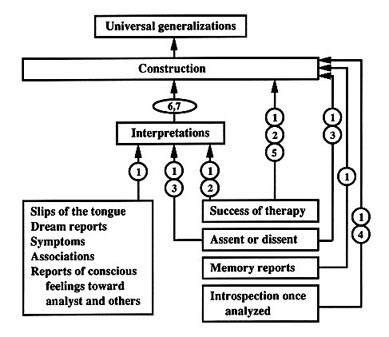Psychoanalysis: Is it Science?
Adolf Grünbaum disagrees with Popper. Grünbaum believes that Freud meant his theory to be scientific, that he made falsifiable predictions, and that those predictions proved false. For example, Freud's Master Proposition, also known as the Necessary Condition Thesis (NCT), is that ONLY psychoanalysis can produce a durable cure of a psychoneurosis (a mental illness caused by childhood trauma). This is a strong statement that could be falsified if, for example, another form of therapy such as behavior therapy cured someone of a neurosis, or even if spontaneous remission occurred. We now know that neurosis yields to both of these alternatives. Therefore, Grünbaum concludes that psychoanalysis, being false, is bad science.
The figure below (Von Eckardt, 1986) represents epistemological problems in Freud's use of clinical data as discussed by Grünbaum (1984) (circled numbers correspond to numbered problems; arrows represent the relation "is considered evidence for"). Grünbaum's Arguments
LEVELS
PROBLEMS
- suggestibility (pp. 130-135);
- failure of tally argument (pp. 135-172);
- weakness of consilience argument (pp. 273-278);
- Nisbett and Wilson findings (pp. 147-148);
- problems with Breuer-Freud argument (pp. 177-189);
- problems with extrapolation to slips and dreams (pp. 190-239);
- problems with establishing causal claims by retrospective testing (pp. 177-189).
Grünbaum, A. (1984). The foundations of psychoanalysis: A philosophical critique. Berkeley, CA: University of California Press.
Von Eckardt, B. (1986). Grünbaum's challenge to Freud's logic of argumentation: A reconstruction and an addendum. The Behavioral and Brain Sciences, 9, 262-263.
Personality research









